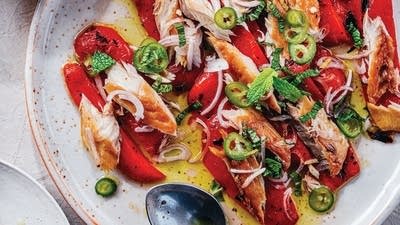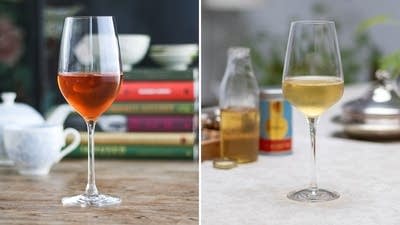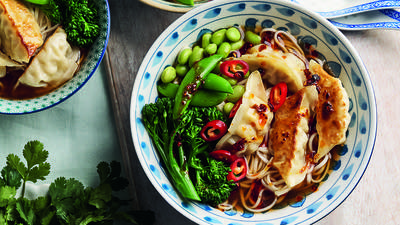
About ten years ago, Homa Dashtaki was laid off from her dream job, and was not in a good place. Her father was dealing with the death of his brother. And to keep themselves preoccupied so they couldn’t dwell on their sadness, they started making yogurt together. They strained it, so it was thick and rich, and that yogurt became the basis for Homa’s company, The White Moustache. It’s become a cult favorite, with magazines like Bon Appetit singing its praises.
However, Homa realized that she didn’t feel totally great about all the success. Because the more yogurt she made, the more she kept thinking about all the byproduct, the liquid whey, she was pouring down the drain. Yogurt whey is a tangy, nutritious, probiotic liquid that people use all around the world – except here in the U.S.
Homa invited Francis Lam into her factory to discuss why she decided to stop growing her company until she could figure out a way to sell the whey, and how it’s become more complicated than she ever realized.
Francis Lam: We are in your vat room. What we’re looking at here are these two vats. They're 80 gallons each?
Homa Dashtaki: They're 80 gallons each, and while they may seem enormous, you have the option of going up to a 200-gallon batch or larger. I've chosen to have two going; this is my max size that I'm going to operate at, because I think that yogurt tastes different when there's more probiotics, or they have a bigger space to grow in. I think there's some dry, tannin-y thing that happens in your mouth, actually. This room is built to make many small batches, which is kind of our business model, I guess, or our M.O.
FL: How did you get into making yogurt?
HD: Totally by accident. I was an attorney. I got laid off, and then I like – such a cliché – tried to find myself. It's a very boring story. But then I started making yogurt because it's the one thing that my dad always did at home that I took for granted and I didn't even value. We just found ourselves at a place in life where we were both bored, I was unemployed, I was living with my parents at like thirty-something, it was pathetic. I was like, let's just go to farmer's markets and do this to have a way to spend time. Me and my dad are quite close. It wasn't supposed to be a business.
When people tried our yogurt at the farmer's markets, their reaction was if they never tried yogurt before. This isn't something I tried to go after or tried to create. It's literally something I'd ignored my whole life. My idea of success was like a very typical, American idea of success. It was to be a lawyer, to do well, to get into a good firm, to make money. I had done all those things, and yet, the irony is, this one part of my heritage that I ignored forever, has actually given me the most amount of happiness and success. It was all by accident. By trying to go to farmer's markets and hang out with my dad and flirt with some boys – that was the goal. Our first farmer's market we made 12 bucks, and I was like, I think we're onto something here.
 Homa Dashtaki
Photo provided by The White Moustache
Homa Dashtaki
Photo provided by The White Moustache
FL: I know there were some trials and tribulations, you had to move from California to New York because of regulatory issues, but I remember when I first saw The White Mustache yogurt here. I can't even say that it was saw, I heard. People were yelling at me, “You have to try this yogurt, it's amazing!” It seemed like you were exploding, we could find your yogurt in fancy stores, and then more stores around the city, but then you decided to stop growing the business.
HD: Yeah.
FL: Why?
HD: Many reasons. One was that growth trajectory that you just explained was a miracle. The fact that we were in existence was a miracle, after all our trials and tribulations. The fact that we're making this product that, to me, feels like a miracle. And then we're growing, store after store after store, all through word of mouth. I felt very humbled by that in a way that I've never felt humbled by anything before. I was like, this is bigger than me, and it's not about me, and my only job is to take care of this thing.
FL: To take care of the milk.
HD: To take care of the milk. Even the brand, which is named after my dad, and our heritage, which has informed how we make all this, and the cows that give us the milk that give us this stuff.
When you're making yogurt in these relatively small batches, and you're straining it, and you have this pan of whey, and there's nowhere to put it, it feels weird. It feels wrong. Traditionally, we just drink it, because there isn't really that much. When you make it at home, you have a little bit, and you either incorporate it right back in, or you throw it out, or we'd just shoot it, because it was a nice refreshing little shot of yogurt water. But now we're swimming in it, as a company. What do you do with it? I really thought I was onto something. I was like, I'm going to put it in a bottle and slap a label on here that says it's whey, and people are going to love it. It’s going to be like the new Gatorade. It was just crickets. Radio silence. No response.
We were so spoiled with the success of our yogurt that this was a thing. We had hit capacity. I can either grow more or I can dedicate the resources that we have back into the whey. Because our existence is so unique, and the way White Moustache came into being feels very unique and very lucky, I feel like we're more of an advocacy kind of company than a food company. In 2014, we capped our own production and we dedicated all our resources to finding a market for the whey. I realized the plain whey wasn't doing it, so I made flavored whey, which I mix it with natural fruit juices. We have pineapple, passion fruit, honey, lime, ginger. Then we just launched a line of popsicles last year as well, that just is whey and fresh fruit.
FL: Meanwhile, people are still trying to pound on your door for more yogurt. I'm standing in the vat room. There's clearly space for more vats in the vat room.
HD: But that means more whey. It's like, what's my hurry? If I just take my time and figure this out, I will have solved an amazing problem. But also to me, it doesn't seem like a problem. I've got this really cool thing, and somebody needs to figure out what to do with it, because it's going to be awesome. I don't think it's going to be me. My job is just to make yogurt here.
FL: But what's the deal with whey? Why does it matter to you? Why would you not just pour it down the drain?
HD: Because it's still milk, and there was such a process to get to it. I had to make the yogurt, and then strain it, and then I have this, what I think of a golden elixir, it's water that was filtered through the grass that was then filtered through the cow, that was then filtered through yogurt making. That's the only way you can get this probiotic-rich, full of calcium, vitamins, no calories, no fat, nothing. I just think it's like the most special part of this whole process.
FL: Can we taste the whey?
HD: Yes, please. Here's the plain whey, straight up.
FL: Like you said, it looks almost Gatorade. Not quite as garish as Gatorade, but it's got a unique yellowish tint. [Francis samples whey.] Oh, wow! I'm a fan of plain yogurt, like on food and stuff, and so much of what I think of the flavor of yogurt is purely crystallized in this whey. It doesn't taste fatty, it doesn't taste sweet, but the thing that makes the yogurt tangy, the thing that makes the yogurt feel like it has character, it's purely crystallized in this drink.
HD: I think you've also managed to articulate why it doesn't resonate, because it's missing – when you call it yogurt, the associate is creamy.
FL: Creaminess, yeah.
HD: It still has a dairy mouthfeel to it.
FL: It's not sharp.
HD: It's not like water.
FL: Yeah. There's a body to it, for sure. It's tangy, it's sour, but it's not sharp and piercing. It's not like lemon juice. It still has a smoothness to it. Oh, I like it. Let's taste it flavored.
HD: The reason why we do it flavored, first, it's not plain, or the reason we added flavors, is because the plain whey wasn't resonating, so we thought we'd make it more familiar by adding fruit juices and making it a drink.
 Francis and Homa sample different flavors of probiotic tonic and fruited whey at The White Moustache.
Photos: Erika Romero | The White Moustache
Francis and Homa sample different flavors of probiotic tonic and fruited whey at The White Moustache.
Photos: Erika Romero | The White Moustache
FL: I see the label, it doesn't say whey. It says probiotic tonic.
HD: Right. I feel terrible about that, really I do. I feel like my mom when she was trying to make me eat liver and she covered it up with sauce. I feel like a horrible person. But also, do you not see my desperation screaming through on this? This is so good! It's funny – and this is a total tangent – but as an immigrant, I'm a little resentful to the whole process, because I don't want to make myself familiar to you, I don't want to make myself accessible to you. This is who I am. I'm this weird, inaccessible, unfamiliar thing, that's just who I am.
FL: Yeah, let me be me.
HD: Let me be me.
FL: And come see what I'm worth.
HD: That's why I was a little resistant to that. And then I was like, I'm going to snap out of it. Don't be weird, don't get all existential about this. Then we came up with a line of popsicles where we're using the sour cherry juice from our leftover preserves to mix with the whey popsicles; the idea of the popsicles is entirely salvage oriented.
Whereas White Mustache gets it reputation for being in this beautiful glass jars, this was thought out because I was trying to be environmentally sound, yes, but I was also being kind of cheap. What's more recyclable than taking this jar back and steam cleaning it and reusing it? I can actually recycle this stuff. That went into the idea of the popsicles, too, because we wrapped them in these nostalgic tubes – which might seem counterintuitive because it's not gourmet oriented – that uses almost 50 percent less plastic than a traditional popsicle does that you have to wrap up and package. Those are things that we try to do and that inform our entire product line. But it's exhausting. It's exhausting to explain, but it's also exhausting because you just get it wrong so many times. Pineapples are not the most socially responsibly harvested fruit in the world, you know?
FL: You try to do one thing, you find an answer, and it opens up other questions.
HD: Right. And there's so much waste. We're still putting our popsicles in a plastic tube; that doesn't make me feel good. Our caps are made out of plastic. There's so much energy that goes into pressing one mold of glass. These thoughts are almost paralyzing. But, I think we've done really good work in terms of just getting ourselves out there. It hasn't translated into sales. It hasn't translated into a market for the whey, or even other yogurt companies doing it. But, I think something like this does take time. I'm willing to give it that. We've moved this process along about as slowly as it takes us to make a batch of yogurt.
Before you go...
Each week, The Splendid Table brings you stories that expand your world view, inspire you to try something new, and show how food connects us all. We rely on your generous support. For as little as $5 a month, you can have a lasting impact on The Splendid Table. And, when you donate, you’ll join a community of like-minded individuals who love good food, good conversation, and kitchen companionship. Show your love for The Splendid Table with a gift today.
Thank you for your support.
Donate today for as little as $5.00 a month. Your gift only takes a few minutes and has a lasting impact on The Splendid Table and you'll be welcomed into The Splendid Table Co-op.




